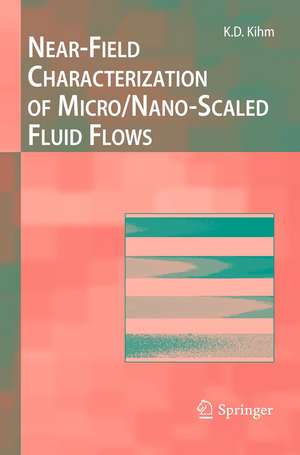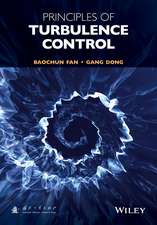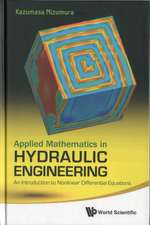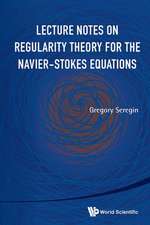Near-Field Characterization of Micro/Nano-Scaled Fluid Flows: Experimental Fluid Mechanics
Autor Kenneth D Kihmen Limba Engleză Paperback – 18 apr 2014
| Toate formatele și edițiile | Preț | Express |
|---|---|---|
| Paperback (1) | 629.18 lei 6-8 săpt. | |
| Springer Berlin, Heidelberg – 18 apr 2014 | 629.18 lei 6-8 săpt. | |
| Hardback (1) | 633.74 lei 6-8 săpt. | |
| Springer Berlin, Heidelberg – 11 apr 2011 | 633.74 lei 6-8 săpt. |
Din seria Experimental Fluid Mechanics
- 18%
 Preț: 722.88 lei
Preț: 722.88 lei - 15%
 Preț: 640.22 lei
Preț: 640.22 lei - 18%
 Preț: 2476.38 lei
Preț: 2476.38 lei - 18%
 Preț: 1217.67 lei
Preț: 1217.67 lei - 18%
 Preț: 1375.92 lei
Preț: 1375.92 lei - 18%
 Preț: 1100.18 lei
Preț: 1100.18 lei - 18%
 Preț: 1213.29 lei
Preț: 1213.29 lei - 15%
 Preț: 650.78 lei
Preț: 650.78 lei - 24%
 Preț: 786.71 lei
Preț: 786.71 lei - 15%
 Preț: 633.41 lei
Preț: 633.41 lei - 15%
 Preț: 635.34 lei
Preț: 635.34 lei - 18%
 Preț: 731.37 lei
Preț: 731.37 lei - 18%
 Preț: 1111.29 lei
Preț: 1111.29 lei - 18%
 Preț: 1544.52 lei
Preț: 1544.52 lei
Preț: 629.18 lei
Preț vechi: 740.22 lei
-15% Nou
Puncte Express: 944
Preț estimativ în valută:
120.50€ • 124.15$ • 100.94£
120.50€ • 124.15$ • 100.94£
Carte tipărită la comandă
Livrare economică 22 februarie-08 martie
Preluare comenzi: 021 569.72.76
Specificații
ISBN-13: 9783642267376
ISBN-10: 3642267378
Pagini: 164
Ilustrații: VIII, 156 p.
Dimensiuni: 155 x 235 x 9 mm
Greutate: 0.24 kg
Ediția:2011
Editura: Springer Berlin, Heidelberg
Colecția Springer
Seria Experimental Fluid Mechanics
Locul publicării:Berlin, Heidelberg, Germany
ISBN-10: 3642267378
Pagini: 164
Ilustrații: VIII, 156 p.
Dimensiuni: 155 x 235 x 9 mm
Greutate: 0.24 kg
Ediția:2011
Editura: Springer Berlin, Heidelberg
Colecția Springer
Seria Experimental Fluid Mechanics
Locul publicării:Berlin, Heidelberg, Germany
Public țintă
ResearchCuprins
Introduction.- Definitions of near-field.- Evanescent wave penetration depth.- Surface.- Photon penetration skin-depth into metal.- Penetration depth of no-slip boundary conditions.- Equilibrium height (hm) for small particles under near-field forces.- Total Internal Reflection Microscopy (TIRM).- Ratiometric TIRM imaging analysis.- Near-field applications of TIRM.- Near-wall hindered Brownian motion of nanoparticles.- Slip-flows in the near-field.- Cytoplasmic viscosity and intracellular vesicle sizes.- Optical Serial Sectioning Microscopy (OSSM).- Point spread functions (PSFs) under aberration-free design conditions.- Point spread functions (PSFs) under off-design conditions.- Principles of OSSM.- Near-field applications of OSSM.- Three-dimensional particle tracking velocimetry (PTV).- Near-wall thermometry.- Near-field mixture concentration measurements.- Confocal Laser Scanning Microscopy (CLSM).- Principles of confocal imaging.- Microscopic imaging resolutions.- Confocal microscopic imaging resolutions.- Optical slicing thickness of confocal microscopy.- Confocal laser scanning microscopic particle imaging velocimetry (CLSM-PIV) system.- Near-field applications of CLSM-PIV.- Poiseuille flows in a microtube.- Microscale rotating Couette flows.- Moving bubbles in a microchannel.- Surface Plasmon Resonance Microscopy (SPRM).- Surface plasmon polaritons (SPPs).- Dispersion of SPP.- Kretschmann’s three-layer configuration.- Surface plasmon resonance (SPR) reflectance.- Surface plasmon resonance microscopy (SPRM) imaging systems.- Selection of a prism for SPRM.- SPR reflectance imaging resolution.- Near-field applications of SPRM.- History and uses of SPRM.- Label-free mapping of microfluidic mixing fields.- Near-field mapping of salinity diffusion.- Dynamic monitoring of nanoparticle concentration profiles.- Unveiling the fingerprints of nanocrystalline self-assembly.- Near-wall thermometry.- Reflection Interference Contrast Microscopy(RICM).- Interference of plane waves.- Principles and practical issues of RICM.- Near-field applications of RICM.- Thin-film thickness measurements.- Electrohydrodynamic (EHD) control of thin liquid film.- Dynamic fingerprinting of live-cell focal contacts.- References.
Notă biografică
The near-field – the region within 100 nm from a solid interface - is an exciting arena in which several important multi-scale transport phenomena are physically characterized, such as flow mixing and drag, heat and mass transfer, near-wall behavior of nanoparticles, the binding of bio-molecules, crystallization, and surface deposition processes, just to name a few. This book presents a number of microscopicimaging techniques that were implemented and tested for near-field fluidic characterizations. These methods include Total Internal Reflection Microscopy (TIRM), Optical Serial Sectioning Microscopy (OSSM), Confocal Laser Scanning Microscopy (CLSM), Surface Plasmon Resonance Microscopy (SPRM), and Reflection Interference Contrast Microscopy (RICM). The basic principles, specifics of implementation, and example applications of each method are presented in order to promote the reader’s understanding of the techniques, so that these may be applied to their own research interests.
Textul de pe ultima copertă
The near-field – the region within 100 nm from a solid interface - is an exciting arena in which several important multi-scale transport phenomena are physically characterized, such as flow mixing and drag, heat and mass transfer, near-wall behavior of nanoparticles, the binding of bio-molecules, crystallization, and surface deposition processes, just to name a few. This book presents a number of microscopicimaging techniques that were implemented and tested for near-field fluidic characterizations. These methods include Total Internal Reflection Microscopy (TIRM), Optical Serial Sectioning Microscopy (OSSM), Confocal Laser Scanning Microscopy (CLSM), Surface Plasmon Resonance Microscopy (SPRM), and Reflection Interference Contrast Microscopy (RICM). The basic principles, specifics of implementation, and example applications of each method are presented in order to promote the reader’s understanding of the techniques, so that these may be applied to their own research interests.
Caracteristici
Presents a number of label-free experimental techniques Presentation on each technique is laid out for the working principle Written for experts in this field











